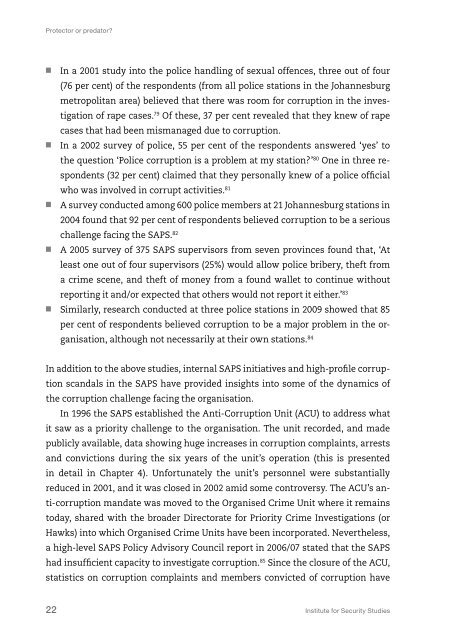Protector or predator? - Institute for Security Studies
Protector or predator? - Institute for Security Studies
Protector or predator? - Institute for Security Studies
Create successful ePaper yourself
Turn your PDF publications into a flip-book with our unique Google optimized e-Paper software.
<strong>Protect<strong>or</strong></strong> <strong>or</strong> predat<strong>or</strong>?<br />
■■<br />
In a 2001 study into the police handling of sexual offences, three out of four<br />
(76 per cent) of the respondents (from all police stations in the Johannesburg<br />
metropolitan area) believed that there was room f<strong>or</strong> c<strong>or</strong>ruption in the investigation<br />
of rape cases. 79 Of these, 37 per cent revealed that they knew of rape<br />
cases that had been mismanaged due to c<strong>or</strong>ruption.<br />
■■<br />
In a 2002 survey of police, 55 per cent of the respondents answered ‘yes’ to<br />
the question ‘Police c<strong>or</strong>ruption is a problem at my station?’ 80 One in three respondents<br />
(32 per cent) claimed that they personally knew of a police official<br />
who was involved in c<strong>or</strong>rupt activities. 81<br />
■■<br />
A survey conducted among 600 police members at 21 Johannesburg stations in<br />
2004 found that 92 per cent of respondents believed c<strong>or</strong>ruption to be a serious<br />
challenge facing the SAPS. 82<br />
■■<br />
A 2005 survey of 375 SAPS supervis<strong>or</strong>s from seven provinces found that, ‘At<br />
least one out of four supervis<strong>or</strong>s (25%) would allow police bribery, theft from<br />
a crime scene, and theft of money from a found wallet to continue without<br />
rep<strong>or</strong>ting it and/<strong>or</strong> expected that others would not rep<strong>or</strong>t it either.’ 83<br />
■■<br />
Similarly, research conducted at three police stations in 2009 showed that 85<br />
per cent of respondents believed c<strong>or</strong>ruption to be a maj<strong>or</strong> problem in the <strong>or</strong>ganisation,<br />
although not necessarily at their own stations. 84<br />
In addition to the above studies, internal SAPS initiatives and high-profile c<strong>or</strong>ruption<br />
scandals in the SAPS have provided insights into some of the dynamics of<br />
the c<strong>or</strong>ruption challenge facing the <strong>or</strong>ganisation.<br />
In 1996 the SAPS established the Anti-C<strong>or</strong>ruption Unit (ACU) to address what<br />
it saw as a pri<strong>or</strong>ity challenge to the <strong>or</strong>ganisation. The unit rec<strong>or</strong>ded, and made<br />
publicly available, data showing huge increases in c<strong>or</strong>ruption complaints, arrests<br />
and convictions during the six years of the unit’s operation (this is presented<br />
in detail in Chapter 4). Unf<strong>or</strong>tunately the unit’s personnel were substantially<br />
reduced in 2001, and it was closed in 2002 amid some controversy. The ACU’s anti-c<strong>or</strong>ruption<br />
mandate was moved to the Organised Crime Unit where it remains<br />
today, shared with the broader Direct<strong>or</strong>ate f<strong>or</strong> Pri<strong>or</strong>ity Crime Investigations (<strong>or</strong><br />
Hawks) into which Organised Crime Units have been inc<strong>or</strong>p<strong>or</strong>ated. Nevertheless,<br />
a high-level SAPS Policy Advis<strong>or</strong>y Council rep<strong>or</strong>t in 2006/07 stated that the SAPS<br />
had insufficient capacity to investigate c<strong>or</strong>ruption. 85 Since the closure of the ACU,<br />
statistics on c<strong>or</strong>ruption complaints and members convicted of c<strong>or</strong>ruption have<br />
22<br />
<strong>Institute</strong> f<strong>or</strong> <strong>Security</strong> <strong>Studies</strong>

















